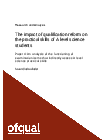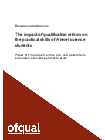The impact of qualification reform on the practical skills of A level science students

These reports describe a five-part study from a programme of research that Ofqual conducted to evaluate the impact of qualification reform on the practical skills of A level science students.
Documents

The impact of qualification reform on A level science practical work. Paper 1: Teacher perspectives after one year (Cadwallader & Clinckemaillie, 2017)
Ref: Ofqual/17/6251PDF, 631KB, 40 pages
This file may not be suitable for users of assistive technology. Request an accessible format.
If you use assistive technology (such as a screen reader) and need aversion of this document in a more accessible format, please email [email protected].Please tell us what format you need. It will help us if you say what assistive technology you use.

The impact of qualification reform on the practical skills of A level science students. Paper 2: Pre- and post-reform evaluation of science practical skills (Cadwallader, 2018)
Ref: Ofqual/18/6371PDF, 1.94MB, 66 pages
This file may not be suitable for users of assistive technology. Request an accessible format.
If you use assistive technology (such as a screen reader) and need aversion of this document in a more accessible format, please email [email protected].Please tell us what format you need. It will help us if you say what assistive technology you use.

The impact of qualification reform on the practical skills of A level science students. Paper 3: Valid discrimination in the assessment of practical performance (Cadwallader, Cuff and Khan, 2018)
Ref: Ofqual/18/6372PDF, 760KB, 39 pages
This file may not be suitable for users of assistive technology. Request an accessible format.
If you use assistive technology (such as a screen reader) and need aversion of this document in a more accessible format, please email [email protected].Please tell us what format you need. It will help us if you say what assistive technology you use.

Practical skills assessment in A level science Paper 4: An analysis of the functioning of examination items that indirectly assess A level science practical skills (Cadwallader, 2018)
PDF, 1.56MB, 36 pages
This file may not be suitable for users of assistive technology. Request an accessible format.
If you use assistive technology (such as a screen reader) and need aversion of this document in a more accessible format, please email [email protected].Please tell us what format you need. It will help us if you say what assistive technology you use.

The impact of qualification reform on the practical skills of A level science students. Paper 5: Final report on the pre- and post-reform evaluation of science practical skills (Cadwallader, 2019)
Ref: Ofqual/19/6498PDF, 2.23MB, 83 pages
This file may not be suitable for users of assistive technology. Request an accessible format.
If you use assistive technology (such as a screen reader) and need aversion of this document in a more accessible format, please email [email protected].Please tell us what format you need. It will help us if you say what assistive technology you use.
Details
Between 2016 and 2019, Ofqual conducted a programme of research to evaluate the impact of qualification reform on the practical skills of students who study A level science. The five reports based on this work are above.
The reformed assessment arrangements are intended to promote frequent practical work that is closely integrated with the subject content and covers a breadth of skills. However, some stakeholders expressed concern that the new approach may have the unintended consequence that schools would treat practical science as less of a priority and so students’ practical skills would decline. Papers 1, 2 and 5 investigate this issue.
Reassuringly, there is no evidence to suggest that practical skills have declined as a result of the reform. Our 3 year research project with universities (Papers 2 and 5) showed no significant overall difference between the practical skills of pre-reform students and post-reform students in either chemistry or physics. For biology, the post-reform students outperformed the pre-reform students.
Most of the teachers we interviewed (Paper 1) perceived many aspects of the reform to be positive for the teaching and learning of practical skills. Schools and colleges, however, have not been affected in a uniform way and the report explores the mechanisms through which the reform is being implemented and experienced in different ways.Paper 4 discusses the indirect assessment of practical skills through written examination. The analysis provides an insight into how the questions that were designed to assess practical skills in the 2017 A level science examinations functioned in relation to other questions.
Finally, Paper 3 is more theoretical, it describes a study that was designed to help improve our understanding of how competence in hands-on practical work is judged by examiners. It applies an experimental approach to explore whether there is a particular number of grades into which examiners can best differentiate practical performances in a reliable manner. The findings suggest that carefully constructed marking schemes or assessment criteria, probably combined with a robust system for standardisation, would be necessary to ensure consistency of judgement should individual practical techniques be assessed in isolation.
To conclude, it is important to be aware of the fluidity of the situation in schools and colleges. The reformed qualifications are still relatively new and the way in which examination boards and teachers implement the new assessment arrangements may change over time. It is important to continue to monitor the impact of the new qualifications and the accompanying assessment arrangements in schools and colleges. Ofqual remains open-minded about the assessment of practical skills and committed to an evidence-based approach.
Published 10 October 2018
Last updated 5 April 2019 + show all updates
- Publication of the final part of the study (paper 5) and the relocation of papers 1-3, bringing all 5 parts of the study together.
- First published.











Responses